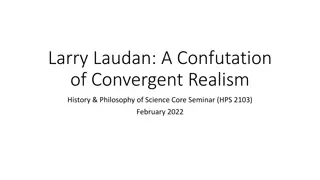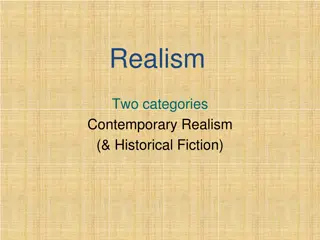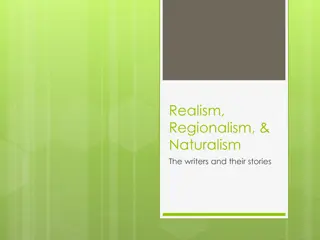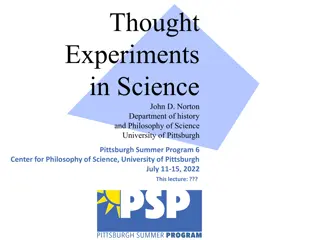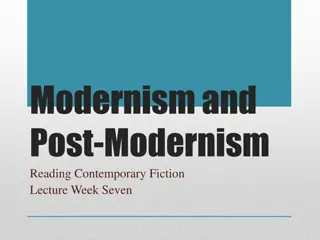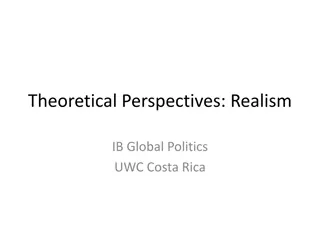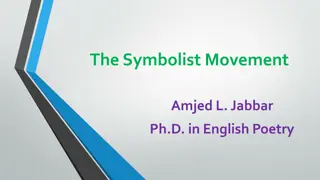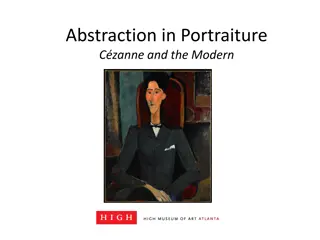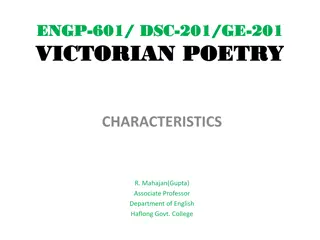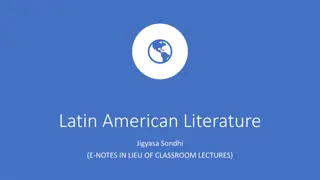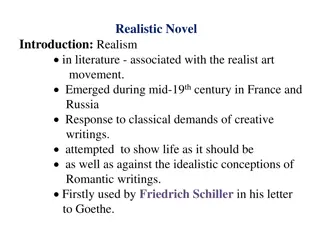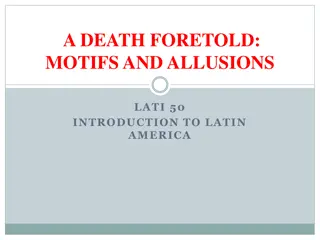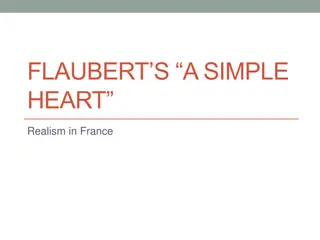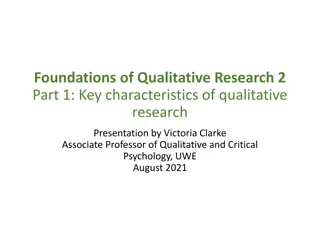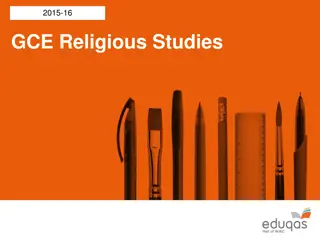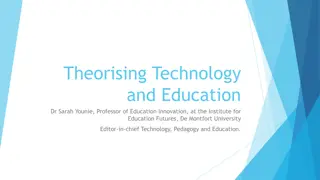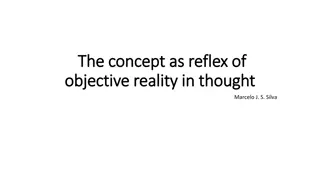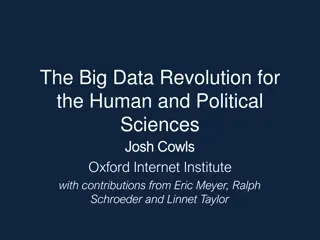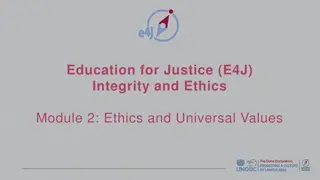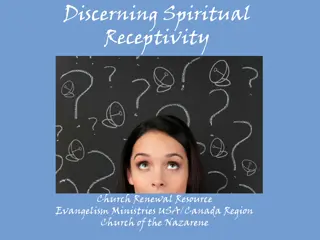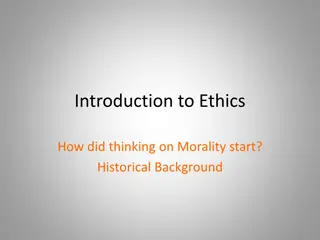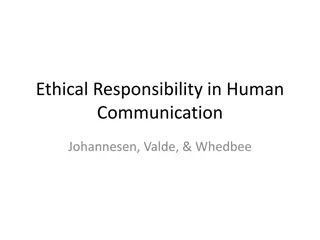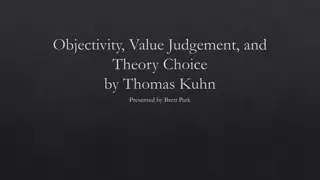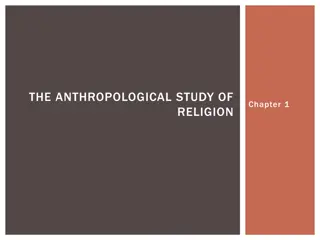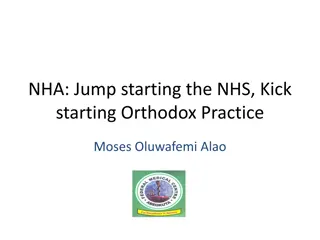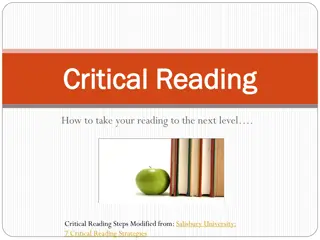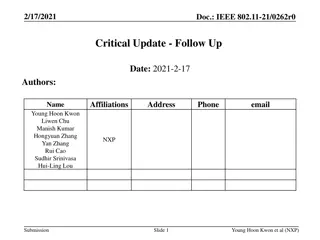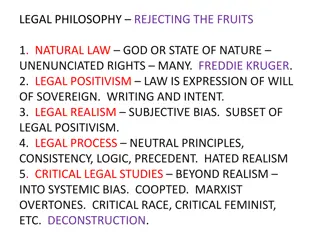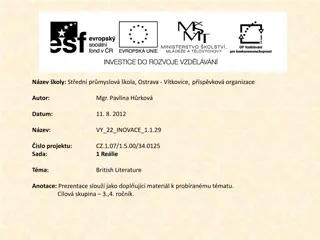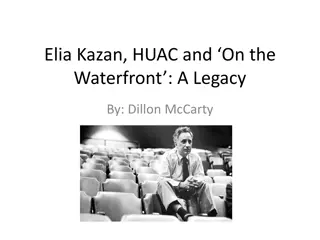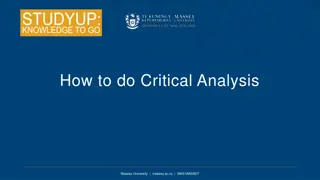Understanding Epistemological Relativism in Critical Realism
Epistemological relativism, as explored by Ismael Al-Amoudi, emphasizes how our socio-cultural contexts influence our ways of knowing and seeing the world. It goes beyond mere fallibilism, acknowledging the impact of diverse factors on knowledge production. This concept is significant for researchers in the social sciences, shaping how they approach research activities and engage in academic debates within a multidimensional framework.
Uploaded on Sep 25, 2024 | 0 Views
Download Presentation

Please find below an Image/Link to download the presentation.
The content on the website is provided AS IS for your information and personal use only. It may not be sold, licensed, or shared on other websites without obtaining consent from the author. Download presentation by click this link. If you encounter any issues during the download, it is possible that the publisher has removed the file from their server.
E N D
Presentation Transcript
EPISTEMOLOGICAL RELATIVISM Ismael Al-Amoudi, Centre for Social Ontology and Digital Chair (Grenoble Ecole de Management)
STRUCTURE OF THE WEBINAR Part I (c. 45 minutes): on critical realism What is the meaning of epistemological relativism? How is epistemological relativism articulated in CR? What is the significance of epistemological relativism for researchers in the social sciences? Part II (c. 45 minutes): discussion around your research How do the questions addressed in Part I bear on your research activities? e.g. Designing empirical studies Theorising novel constructs Engaging in academic debates
MEANING OF EPISTEMOLOGICAL RELATIVISM? Dictionary definition: relativism is a doctrine proposing that truth or morality is relative to situations and not absolute or universal (Oxford English Dictionary). NB: - Truth and morality clubbed together in this definition - Relativism is expressed re. situations. But what about subjects of knowledge? An example: Sally works more than Harry - How do you measure the amount of work? -What is significant about Sally working more than Harry?
MEANING OF EPISTEMOLOGICAL RELATIVISM IN CR? [epistemological relativism] expresses the idea that our categories, frameworks of thinking, modes of analysis, ways of seeing things, habits of thought, dispositions of every kind, motivating concerns, interests, values and so forth, are affected by our life paths and socio-cultural situations and thereby make a difference in how we can and do see or know or approach things, and indeed they bear on which we seek to know. (Lawson 2003: 162. Theorizing ontology. Feminist Economics, 9 (1), 161 169.) NB: - Contextual conditions affect but do not necessarily determine entirely how we produce knowledge - Epistemological relativism entails much more than fallibilism ER also relevant to the way we see things and to our motivations to know I know I may be wrong but also there are various ways of accounting for X and studying X is interesting for some people but not for others and even the production of truth is a political process
LOCATING EPISTEMOLOGICAL RELATIVISM IN CRITICAL REALISM Ontological realism Epistemological relativism Judgmental rationality
SIGNIFICANCE OF E.R. FOR EVALUATING RESEARCH What makes good knowledge depends at once on the state of affairs described (onto realism) rational procedures of justification within a community (judgmental rationality) the knowing subject and her community of knowledge (epistemological relativism) The value of knowledge is multi-dimensional E.g. descriptive accuracy vs predictive power vs explanatory power vs emancipatory power vs instrumental usefulness Sometimes one theory offers a better explanation whereas another offers better predictability. Instrumental usefulness is also an ethical question. C.f. Kuhn (esp. postscript to Structure of Scientific Revolutions)
SIGNIFICANCE OF E.R. FOR CONDUCTING RESEARCH Challenges the divide between the theorist and everyone else (Rutzou, Blog March 2018) Social scientist occupies a particular standpoint and so do participants. Social scientist can have a different perspective that is made possible by privileged conditions of enquiry - time to read and think - ability to navigate through various settings. But participants are also more competent than social scientist in many regards, esp. re. their daily practices. Importance of local knowledge Cf. Scott (1999): Seeing like a State: How Certain Schemes to Improve the Human Condition Have Failed. Yale. Attend to knowledge production as a social (& political) process C.f. Varman, R. and Al-Amoudi, I. (2016) Accumulation through derealization: How corporate violence remains unchecked. Human Relations.
SIGNIFICANCE OF E.R. FOR ENGAGING IN ACADEMIC DEBATES Academic debate involves more than getting the facts right Knowledge is also evaluated according to implicit values - Paradigms, communities of knowers Increased respect for your adversaries theses because it takes time to understand all they can see from their own perspective Usually the confrontation of 2 sets of ideas gives rise to an altogether third set of ideas Knowledge production is a dialectical process and your intellectual adversaries are part of it
STRUCTURE OF THE WEBINAR Part I (c. 45 minutes): on critical realism What is the meaning of epistemological relativism? How is epistemological relativism articulated in CR? What is the significance of epistemological relativism for researchers in the social sciences? Part II (c. 45 minutes): discussion around your research How do the questions addressed in Part I bear on your research activities? e.g. Designing empirical studies Theorising novel constructs Engaging in academic debates
ON THE SAME TOPIC FROM THE SAME AUTHOR Theoretical papers addressing directly the question of epistemological relativism Al-Amoudi, I. (2007). Relativism . International Encyclopedia of Organization Studies. S. Clegg and J. Bailey (eds), Sage Publications. Al-Amoudi, I. & Willmott, H. (2011). Where Constructionism and Critical Realism Converge: Interrogating the Domain of Epistemological Relativism. Organization Studies, 31 (1), pp. 27-46. Al-Amoudi, I. & Latsis, J. (2017). The limits of ontological critique: from judgmental rationality to justification. Cambridge Journal of Economics, 41(5), pp. 1303-21. Empirical papers inspired by a critical realist interpretation of epistemological relativism Varman, R. & Al-Amoudi, I. (2016). Accumulation through derealization: How corporate violence remains unchecked. Human Relations. 69(10), pp. 1909-35. O Mahoney, J., O Mahoney H. & Al-Amoudi, I. (2017). How can the loggerhead sea-turtle survive? Exploring the journeys of the caretta caretta using ant and critical realism. Organization. 24(6), pp. 781-99. Foroughi, H. & Al-Amoudi, I. (2020). Collective forgetting in a changing organization: when memories become unusable and uprooted. Organization Studies. 41(4), 449 470.



